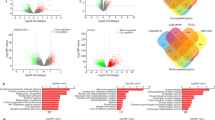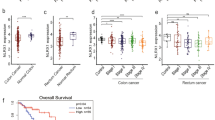Abstract
This study aimed to investigate the mechanisms of LACTB2 in colorectal cancer (CRC). Microarrays and sequencing data of CRC were acquired from UCSC Xena, GTEx, Gene Expression Omnibus, and TCGA. Pooled analysis of the mRNA expression of LACTB2 in CRC was performed using Stata software. The protein expression of LACTB2 in CRC tissues was evaluated by immunohistochemistry. The relationship between immune cell infiltration and LACTB2 expression was investigated using CIBERSORT. The potential signaling pathways and biological mechanisms of LACTB2 were explored using GSEA, KEGG, and GO. Subsequently, further screening of small molecular compounds with potential therapeutic effects on CRC was conducted through the HERB database, followed by molecular docking studies of these compounds with the LACTB2 protein. The integration and analysis of expression data obtained from 2294 CRC samples and 1286 noncancerous colorectal samples showed that LACTB2 was highly expressed in CRC. Immunohistochemistry performed on in-house tissue samples confirmed that LACTB2 protein expression was upregulated in CRC. CIBERSORT revealed lower B cell infiltration levels in the high LACTB2 expression group than in the low expression group. GO, KEGG, and GSEA analyses showed that LACTB2 expression and genes positively correlating with it were mainly related to DNA synthesis and repair, mitochondrial translational elongation and translational termination, phosphorylation, and mTORC1 signaling. Finally, molecular docking simulations confirmed the ability of quercitin to target and bind to LACTB2. This is the first study to demonstrate that LACTB2 is upregulated in CRC. LACTB2 promotes colorectal tumorigenesis and tumor progression.











Similar content being viewed by others

Data Availability
The datasets used and/or analyzed during the current study are available in the NCBI Gene Expression Omnibus (https://www.ncbi.nlm.nih.gov/geo/); GEO accession numbers: GSE24514, GSE49355, GSE68468, GSE77953, GSE110223, GSE3629, GSE4107, GSE4183, GSE5206, GSE9348, GSE13471, GSE15960, GSE21510, GSE23878, GSE32323, GSE33113, GSE37364, GSE41328, GSE62932, GSE110224, GSE81558, GSE113513, GSE54986, GSE75548, GSE106582, GSE21815, GSE35279, GSE15781, GSE20842, GSE25071, GSE28000, GSE41011, GSE44076, GSE47063, GSE62321, GSE87211, GSE103512, GSE115261, GSE126092, GSE141174, GSE156355), the cancer genome database (TCGA: COAD, READ; https://portal.gdc.cancer.gov), and the UCSC Xena (TCGA Colon and Rectal Cancer (COADREAD); https://xenabrowser.net/datapages/).
References
Sung, H., Ferlay, J., Siegel, R. L., Laversanne, M., Soerjomataram, I., Jemal, A., et al. (2021). Global Cancer Statistics 2020: GLOBOCAN estimates of incidence and mortality worldwide for 36 cancers in 185 countries. CA: A Cancer Journal for Clinicians, 71(3):209–249.
Keum, N., & Giovannucci, E. (2019). Global burden of colorectal cancer: Emerging trends, risk factors and prevention strategies. Nature Reviews Gastroenterology & Hepatology, 16(12), 713–732.
He, T., Cheng, X., & Xing, C. (2021). The gut microbial diversity of colon cancer patients and the clinical significance. Bioengineered, 12(1), 7046–7060.
Yashiro, M. (2014). Ulcerative colitis-associated colorectal cancer. World Journal of Gastroenterology, 20(44), 16389–16397.
Johdi, N. A., & Sukor, N. F. (2020). Colorectal cancer immunotherapy: Options and strategies. Frontiers in Immunology, 11, 1624.
Takei, S., Tanaka, Y., Lin, Y. T., Koyama, S., Fukuoka, S., Hara, H. et al. (2024). Multiomic molecular characterization of the response to combination immunotherapy in MSS/pMMR metastatic colorectal cancer. Journal for ImmunoTherapy of Cancer, 12(2).
Guo, L., Wang, Y., Yang, W., Wang, C., Guo, T., Yang, J., et al. (2023). Molecular profiling provides clinical insights into targeted and immunotherapies as well as colorectal cancer prognosis. Gastroenterology, 165(2), 414–28.e7.
Emiloju, O. E., & Sinicrope, F. A. (2023). Neoadjuvant immune checkpoint inhibitor therapy for localized deficient mismatch repair colorectal cancer: A review. JAMA Oncology, 9(12), 1708–1715.
Tjader, N. P., & Toland, A. E. (2024). Immunotherapy for colorectal cancer: insight from inherited genetics. Trends Cancer.
Zhu, Y. J., Li, X., Chen, T. T., Wang, J. X., Zhou, Y. X., Mu, X. L., et al. (2023). Personalised neoantigen-based therapy in colorectal cancer. Clinical and Translational Medicine, 13(11), e1461.
Levy, S., Allerston, C. K., Liveanu, V., Habib, M. R., Gileadi, O., & Schuster, G. (2016). Identification of LACTB2, a metallo-β-lactamase protein, as a human mitochondrial endoribonuclease. Nucleic Acids Research, 44(4), 1813–1832.
Chen, Q., Zheng, W., Zhu, L., Liu, H., Song, Y., Hu, S., et al. (2021). LACTB2 renders radioresistance by activating PINK1/Parkin-dependent mitophagy in nasopharyngeal carcinoma. Cancer Letters, 518, 127–139.
Liu, A. G., Zhong, J. C., Chen, G., He, R. Q., He, Y. Q., Ma, J., et al. (2020). Upregulated expression of SAC3D1 is associated with progression in gastric cancer. International Journal of Oncology, 57(1), 122–138.
Newman, A. M., Liu, C. L., Green, M. R., Gentles, A. J., Feng, W., Xu, Y., et al. (2015). Robust enumeration of cell subsets from tissue expression profiles. Nature Methods, 12(5), 453–457.
Kanehisa, M. (2019). Toward understanding the origin and evolution of cellular organisms. Protein Science, 28(11), 1947–1951.
Kanehisa, M., Furumichi, M., Sato, Y., Ishiguro-Watanabe, M., & Tanabe, M. (2021). KEGG: Integrating viruses and cellular organisms. Nucleic Acids Research, 49(D1), D545–D551.
Sendoya, J. M., Iseas, S., Coraglio, M., Golubicki, M., Robbio, J., Salanova, R., et al. (2020). Pre-existing tumoral B cell infiltration and impaired genome maintenance correlate with response to chemoradiotherapy in locally advanced rectal cancer. Cancers (Basel)., 12(8), 2227.
Largeot, A., Pagano, G., Gonder, S., Moussay, E., & Paggetti, J. (2019). The B-side of cancer immunity: The underrated tune. Cells., 8(5), 449.
Krombach, J., Hennel, R., Brix, N., Orth, M., Schoetz, U., Ernst, A., et al. (2019). Priming anti-tumor immunity by radiotherapy: Dying tumor cell-derived DAMPs trigger endothelial cell activation and recruitment of myeloid cells. Oncoimmunology., 8(1), e1523097.
Cui, C., Wang, J., Fagerberg, E., Chen, P. M., Connolly, K. A., Damo, M., et al. (2021). Neoantigen-driven B cell and CD4 T follicular helper cell collaboration promotes anti-tumor CD8 T cell responses. Cell, 184(25), 6101–18.e13.
Faubert, B., Solmonson, A., & DeBerardinis, R. J. (2020). Metabolic reprogramming and cancer progression. Science., 368(6487), 473.
Xia, L., Oyang, L., Lin, J., Tan, S., Han, Y., Wu, N., et al. (2021). The cancer metabolic reprogramming and immune response. Molecular Cancer., 20(1), 28.
Wu, Z., Zuo, M., Zeng, L., Cui, K., Liu, B., Yan, C., et al. (2021). OMA1 reprograms metabolism under hypoxia to promote colorectal cancer development. EMBO Reports, 22(1), e50827.
Sun, X., Zhan, L., Chen, Y., Wang, G., He, L., Wang, Q., et al. (2018). Increased mtDNA copy number promotes cancer progression by enhancing mitochondrial oxidative phosphorylation in microsatellite-stable colorectal cancer. Signal Transduction and Targeted Therapy, 3, 8.
Liu, Y. D., Zhuang, X. P., Cai, D. L., Cao, C., Gu, Q. S., Liu, X. N., et al. (2021). Let-7a regulates EV secretion and mitochondrial oxidative phosphorylation by targeting SNAP23 in colorectal cancer. Journal of Experimental & Clinical Cancer Research, 40(1), 31.
de la Cruz López, K. G., Toledo Guzmán, M. E., Sánchez, E. O., & García, C. A. (2019). mTORC1 as a regulator of mitochondrial functions and a therapeutic target in cancer. Frontiers in Oncology, 9, 1373.
Shi, H., Chapman, N. M., Wen, J., Guy, C., Long, L., Dhungana, Y., et al. (2019). Amino acids license kinase mTORC1 activity and Treg cell function via small G proteins Rag and Rheb. Immunity, 51(6), 1012–27.e7.
Wei, S., Dai, M., Zhang, C., Teng, K., Wang, F., Li, H., et al. (2021). KIF2C: A novel link between Wnt/β-catenin and mTORC1 signaling in the pathogenesis of hepatocellular carcinoma. Protein & Cell, 12(10), 788–809.
Wu, J., Yeung, S. J., Liu, S., Qdaisat, A., Jiang, D., Liu, W., et al. (2021). Cyst(e)ine in nutrition formulation promotes colon cancer growth and chemoresistance by activating mTORC1 and scavenging ROS. Signal Transduction and Targeted Therapy, 6(1), 188.
Qiu, J., Zhang, S., Wang, P., Wang, H., Sha, B., Peng, H., et al. (2020). BUB1B promotes hepatocellular carcinoma progression via activation of the mTORC1 signaling pathway. Cancer Medicine, 9(21), 8159–8172.
Wang, T., Zhang, W. S., Wang, Z. X., Wu, Z. W., Du, B. B., Li, L. Y., et al. (2020). RAPTOR promotes colorectal cancer proliferation by inducing mTORC1 and upregulating ribosome assembly factor URB1. Cancer Medicine, 9(4), 1529–1543.
Acknowledgements
Clinical pathology support was provided by the Guangxi Key Laboratory of Medical Pathology.
Funding
This study was funded by the Guangxi Medical University Youth Science Foundation (GXMUYSF202423), the Guangxi Zhuang Autonomous Region Health Commission Self-Financed Scientific Research Project (Z-A20220415), and the Guangxi Natural Science Foundation Program (2015GXNSFAA139185).
Author information
Authors and Affiliations
Contributions
HL and RS designed and directed this study. L-ML and J-YW were mainly involved in data collection and analysis. Experimental technical support provided by C-ZL, Y-YF, Y-PY, and D-TZ. Y-FP and Z-XC participated in manuscript writing. All authors discussed the results and approved the submission.
Corresponding author
Ethics declarations
Competing interests
The authors declare that they have no competing interests.
Ethical Approval and Consent to Participate
All procedures of this study followed the declaration of Helsinki. This study was approved by the Ethics Committee of the First Affiliated Hospital of Guangxi Medical University (No. 2022-KY-E-(047)). Written informed consent was obtained from all patients participating in this study.
Consent for publication
Not applicable.
Additional information
Publisher's Note
Springer Nature remains neutral with regard to jurisdictional claims in published maps and institutional affiliations.
Rights and permissions
Springer Nature or its licensor (e.g. a society or other partner) holds exclusive rights to this article under a publishing agreement with the author(s) or other rightsholder(s); author self-archiving of the accepted manuscript version of this article is solely governed by the terms of such publishing agreement and applicable law.
About this article
Cite this article
Li, H., Wen, JY., Liu, CZ. et al. Increased LACTB2 Expression Regulates Oxidative Phosphorylation and mTORC1 Signaling of Colorectal Cancer. Mol Biotechnol (2024). https://doi.org/10.1007/s12033-024-01137-2
Received:
Accepted:
Published:
DOI: https://doi.org/10.1007/s12033-024-01137-2



